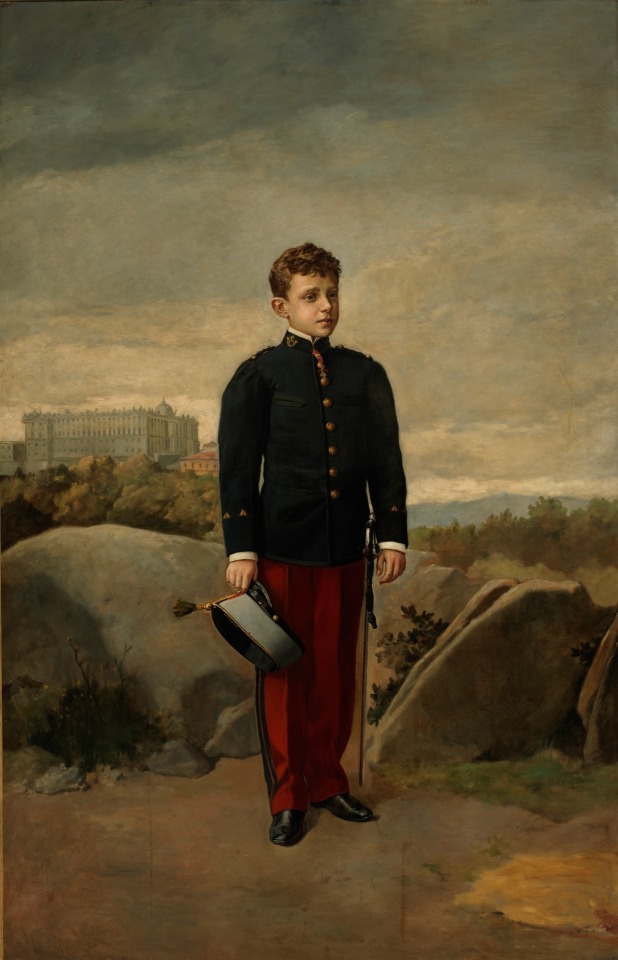#hispaleto
Explore tagged Tumblr posts
Text

Alfonso XIII by Manuel García "Hispaleto".
#manuel garcía#hispaleto#manuel garcia#manuel garcía hispaleto#manuel garcia hispaleto#museo del prado#reino de españa#monarquía española#reyes de españa#alfonso xiii#rey de españa#viva el rey#casa de borbón#full length portrait#kingdom of spain#house of bourbon#full-length portrait
12 notes
·
View notes
Text

Manuel García Hispaleto (Spanish, 1836-1898) Casamiento de Basilio y Quiteria (Don Quijote, capítulo XXI), Detail, 1881 Museo Nacional del Prado, Madrid
#artthatgivesmefeelings#sisterhood#womanhood#Manuel Garcia Hispaleto#spanish art#1800s#wedding of basilio and quiteria#don quijote#classical art#art#fine art#european art#europe#european#oil painting#fine arts#europa#mediterranean#spanish#spain#hispanic#latin#southern europe#western civilization#medieval#best quality online
122 notes
·
View notes
Text
Exposición 'Los libros de Miguel de Cervantes' en Alcalá
Exposición ‘Los libros de Miguel de Cervantes’ en Alcalá
El Museo Casa Natal de Cervantes de Alcalá de Henarés presenta la exposición ‘Los libros de Miguel de Cervantes’, desde el sábado 28 de octubre de 2017 al domingo 6 de mayo de 2018. Se trata de un viaje por la riqueza bibliográfica y artística conservada en el museo alcalaíno que evidencia la universalidad de la obra del autor de Don Quijote de la Mancha. Exposición ‘Los libros de Miguel de…
View On WordPress
#Eventos#Exposiciones y muestras#Libros y revistas#Literatura#Madrid para niños#Municipios Comunidad de Madrid#Museos de Madrid#Ocio#Qué hacer en Madrid
0 notes
Photo

"Casamiento de Basilio y Quiteria. de Hispaleto. Museo del Prado" (Entre 1836 y 1898) de Manuel Garcia Hispaleto
0 notes
Text

Manuel García Hispaleto (Spanish, 1836-1898) Casamiento de Basilio y Quiteria (Don Quijote, capítulo XXI), 1881 Museo Nacional del Prado, Madrid
#Manuel Garcia Hispaleto#spanish art#1800s#wedding of basilio and quiteria#don quijote#classical art#art#fine art#european art#europe#european#oil painting#fine arts#europa#mediterranean#spanish#spain#hispanic#latin#southern europe#western civilization#medieval#best quality online
40 notes
·
View notes
Photo

"Discurso que hizo don Quijote sobre las armas y las letras" (1884) Manuel Garcia Hispaleto
"Truly, ladies and gentlemen," he began, "when you stop to think about it, those who follow the calling of knight-errantry behold some marvelous and unheard-of things. By way of example, let me ask you: What living being is there, in all the world who, coming through the gateway of the castle at this moment and seeing us as we are, would take or believe us to be what we are? Who would say that this Lady at my side is the great queen who is known to all of us, or that I am the famous Knight of the Mournful Countenance? No, there is no doubt that this profession and employment excels all others that men have invented, and it is all the more to be esteemed by reason of the greater perils to which it is subject..."
(Bk. 1, ch. 37, Pp. 395-396; Putnam transl., 1949)
1 note
·
View note
Photo

"Entierro del pastor Crisóstomo" (1862) by Manuel García y García; Hispaleto
QUOTE: "“Heaven made me beautiful—according to you—so that, in spite of yourselves, my beauty moves you to love me. And you insist that I, in return, am bound to love you back. With the natural understanding that God has given me, I recognize that what is beautiful is worthy of love. But what I don’t understand is that just because a woman is loved because of her beauty, she’s obliged to reciprocate this love. And furthermore, it could happen that the one who loves the beautiful woman is himself ugly, and since ugliness is worthy of being despised, it would be silly for him to say: ‘I love you because you’re beautiful; now you must love me, even though I’m ugly.’ But supposing each one is equally good-looking, it doesn’t necessarily mean that their yearnings will be the same, because not every kind of beauty inspires love—some are pleasing to the eye but don’t overcome the will. If every type of beauty caused love and overcame the will in the same way, everyone’s will would wander about confused and perplexed, not knowing which way to go, because—since there’s an infinite array of beautiful things—yearnings would be equally infinite. And according to what I’ve heard, true love cannot be divided, and must be voluntary and not forced. If that’s true, as I believe it is, why do you want to force me to yield my free will simply because you say that you love me? Tell me—what if heaven, which made me beautiful, had made me ugly instead? Would it have been right for me to complain because you didn’t love me? What’s more, consider this: I didn’t choose to be beautiful—heaven made me that way without my asking or choosing to be. So, just as a snake doesn’t deserve to be blamed for the venom given to it by nature—even though it uses the venom to kill—I don’t deserve to be blamed for being beautiful. Beauty in a virtuous woman is like a distant flame or a sharp sword—the one won’t burn and the other won’t cut anyone who doesn’t draw near. Honor and virtue are adornments of the soul, but without them the body shouldn’t seem beautiful, even though it may appear to be. So, if purity is one of the virtues that must adorn both body and soul to make them beautiful, why should the woman who’s loved for her beauty sacrifice her purity by yielding to the wishes of the man who, for his selfish pleasure only, seeks with all his might and wiles to cause her to lose it?"
http://cervantes.tamu.edu/V2/CPI/TEI/TEI_1605/1605/1605/chapter14.html
0 notes